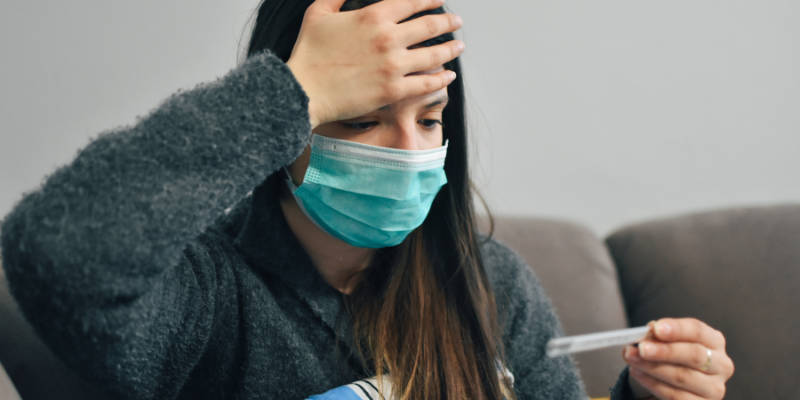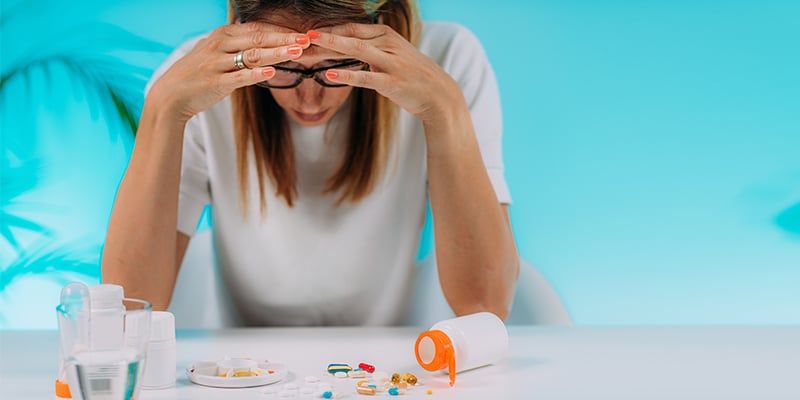
You’ve got questions. These 3 psychiatrists from Amen Clinics have answers. Dr. Robert Johnson, Dr. Jennifer Love, and Dr. Jay Faber recently hosted a webinar to allow viewers to ask them anything about the coronavirus pandemic and its impact on emotional health. Here’s what they had to say.
“I’m early in my recovery. How can I cope?”
Here are 5 key things people in addiction recovery can be doing right now for their health.
- Stay connected to a sponsor or someone who’s a sober encouragement through FaceTime or video chat, not just telephone.
- Find small groups of people that you’re comfortable with and do group chats, so they can have accountability but also just hang out and have a cup of coffee together and have some social time.
- Stay on your sleep schedule. Don’t stay up all night and sleep all day and going into bad behaviors, staying on a clean diet.
- Schedule. Take time at the end of the day and write out everything you’re going to do the next day and fill your schedule. Even if it’s just like “Call mom, watch a film on Netflix, make lunch,” it gives a sense of structure to the day.
- Set an intention. Pick a word of the week—kind, honesty, bravery, peace, calm. Really think about that word and how it applies to you in your life.
“My kids are driving me crazy. They’re just arguing and getting on each other’s nerves constantly. I tried different things to entertain and distract them. It just doesn’t seem to work for very long. Any recommendations?”
“I hear this every other day from one of my patients,” says Dr. Faber. Here are 3 strategies to try.
- Keep a schedule. You don’t have to schedule something every hour, but just break up your day in the morning, afternoon, and evening and make sure your kids have something to do in those 3 time slots. You might want to do that for yourself too to keep your own sense of wellbeing.
- Keep your kids active. Kids who get fidgety or antsy at home may start taking it out on themselves and play can sometimes turn into fighting, arguing, and other unpleasantries. Take advantage of the internet. For example, if your kids are into dance, you can find some of the coolest dance lessons for free or for a nominal charge.
- Encourage your kids to get creative and use FaceTime or Zoom to connect with others. For example, a couple of my older kids have brunch in the morning with their friends online and talk to each other for 30 minutes. This really gives your brain and your whole body an escape from all the internal things that are coming at us on a daily basis.
“I can’t stop worrying where all this is headed—whether I’ll have a job or be able to keep my car. I just end up monitoring events constantly on my phone, my laptop, and TV. Help.”
At this time, we have to figure out what we can control and what we can’t control. And the things we can’t control we have to just put in a box. Here are some techniques based on dialectical behavior therapy (DBT) you can use these to distract yourself from your stressful thoughts.
- Get engaged in activities. This can be anything like doing puzzles, coloring, or painting. “A lot of my patients are doing paint by numbers,” says Dr. Love.
- Contribute to others. Thinking about what you can do for other people is one of the best ways to stop negative ruminations and to help with depressive or anxious ruminations. Who can you be kind to today? If you’re going to the market, can you pick up something for an elderly neighbor? Can you call someone you know is vulnerable?
- Gratitude. Train your brain to look at the things in your space around you that you’re grateful for.
- Limit TV news and social media. The information we get from these sources may be sensationalized and can be harmful to our emotional health. “I had a patient this week in Spain, and she and her 3 children are literally locked up in their apartment. They can get out for 1 hour a week to go grocery shopping and that’s it,” says Dr. Faber. “She’s been trying to contain her own emotions as she watches a lot of social media.”
“What are some healthy grounding techniques to ease or cope through a busy, racing, or anxious mind?”
Practice DBT principles of self-soothing and use all 5 of your senses to help stay grounded. Here are some well-known grounding techniques for people who have trauma in their background or who can dissociate in the context of being triggered emotionally. They’re very simple but very effective.
- Sights. “When I’m really anxious, I like to look at color, I like to look at art. I like a fire in the fireplace or just watching candles,” says Dr. Love. “Even just noticing where you see squares in a space or the color of the carpet can help,” says Dr. Johnson. “Or try standing on one leg with your eyes closed because you can’t stay dissociated, you can’t stay in that anxious space if you have more of a present moment sensate focus.”
- Sound. Listen to the rain or the wind or use white noise machines. You can also go online and play ocean sounds, music, or whatever you love.
- Touch. For touch, many people have animals they can pet. For kids, you can get a huge bucket and just fill it with dried beans and let them stick their feet and hands in it. It’s a very tactile, calming thing. “I’ve even had patients take an ice cube out of the freezer and just stick it on their wrist because it brings you back into the moment faster,” says Dr. Love.
- For scent, you can use candles, food. Add spices when you’re cooking. It smells wonderful. Lavender and vanilla are really calming. “A lot of my patients are using aromatherapy or lotion with a special scent that’s really relaxing,” says Dr. Love.
- Taste. Don’t scarf down junk food. Make something healthy and really savor the bites and take time to enjoy the meal as if you were at a 5-star restaurant. “Yesterday one of my patients asked, ‘Can I take a bite of a lemon?’ and I told them to go for it,” says Dr. Love.
“After surviving the COVID-19 illness, with moderate symptoms for 7 days, what recovery strategies do you suggest for supplements, exercise, nutrition, or other therapeutic techniques to help you when you come out of isolation?”
- Focus on nutrition. Stay away from inflammatory foods like sugar, junk food, cookies, candy, and potato chips. Eat more protein—chicken, fish, or low-fat beef—with no breading. And eat lots of fruits and vegetables.
- Boost your immune system. Some simple things you can do right now is take Vitamin C (500 milligrams twice a day for adults), Vitamin D (5000 IUs), zinc (particularly zinc
picolinate at 25 mg a day), omega-3 fatty acids (try Omega-3 Power) Throw garlic in there as well. - Saunas. If you look at the MERS syndrome that occurred, which was a coronavirus, there was some work done in test tubes looking at how heat causes the virus to die. If you have access to heat, especially saunas that get to 170 to 180 degrees, look about doing that.
- Exercise. “The first several days of this quarantine, I was in absolute CrossFit withdrawal. I was cranky and impatient until I got disciplined enough to start doing some kind of exercise every day,” says Dr. Johnson. Many companies have stepped up and provided free, home-based exercise options.
- Boost your brain. BrainFitLife—a personalized brain training site created by Dr. Daniel Amen and based on research derived from the world’s largest database of functional brain SPECT scans—has lots of awesome content about exercise, nutrition, sleep induction tapes, and brain training games.
“Can you talk about sleep needs during these times and how to improve sleep hygiene during these stressful times?”
Sleep hygiene is so important right now. “If you don’t get eight hours of sleep, we’re more likely to keep inflammatory toxins in our brain,” says Dr. Faber. Be very consistent with the time you go to bed and wake up, don’t take naps, and skip caffeine after lunch. “I create transition times in that hour before bed and in that hour when I get up. That hour before my bed is my spa hour,” says Dr. Love.
“Can we talk about when you’re staying home with an abusive family member and not feeling safe?”
We may be on lockdown, but you have to stay physically safe, emotionally safe, and sexually safe. If you’re with someone 24/7 who’s harmful to you, you’ve got to get out of that situation. Domestic shelters are open or stay with a friend where you can have a refuge. Also be aware of when these episodes more likely to occur, such as if someone is using alcohol or drugs or if someone’s not taking their psychotropic medications. “If your significant other is doing any of those, be much more watchful and be ready to get plan B ready,” says Dr. Faber.
If you’re struggling with anxiety, panic attacks, depression, or other mental health issues, you aren’t alone—45% of Americans say the coronavirus pandemic has impacted their mental health. Just because you’re sheltering at home doesn’t mean you have to wait for the pandemic to be over before seeking help. In fact, during these uncertain times, your mental well-being is more important than ever, and waiting to get treatment is likely to make your symptoms worsen over time.
At Amen Clinics, we’re here for you. We offer mental telehealth, remote clinical evaluations, and video therapy for adults, children, and couples, as well as in-clinic brain scanning to help our patients. Find out more by speaking to a specialist today at 888-288-9834. If all our specialists are busy helping others, you can also schedule a time to talk.





No Comments »
No comments yet.
RSS feed for comments on this post.
Leave a comment